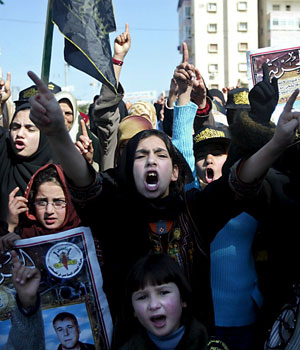
Palestinian supporters of the Islamic Jihad movement shout slogans during a demonstration outside the UN compound in Gaza City, 31 January 2006, denouncing caricatures of the Prophet Mohammed that appeared in Danish and Norwegian publications (EPA)
WASHINGTON (AP) – To broker dual accords in confrontations over Iran’s nuclear program and the future of aid to the Palestinians, the United States is compromising on hard-line positions.
Both pacts patch together surprising alliances against Iran and the incoming Hamas leadership in the Palestinian territories, and give the Bush administration most of what it wants in the short term.
In each case, the agreements put off potential conflicts among the diverse nations and international organizations that signed them by postponing harsh consequences for Tehran or the Palestinians. It is not clear that either issue will ultimately break the administration’s way.
The more surprising, and probably more significant, of the two agreements puts Russia and China on record supporting Iran’s referral to the Security Council when the U.N. nuclear watchdog agency votes on the matter later this week.
The group agreed, though, that the Security Council should wait until March to take up the Iran case. U.S. Secretary of State Condoleezza Rice described the move as a compromise between the U.S. preference for immediate referral and action and the Russian preference to put off referral.
Getting Russia and China to agree to the compromise is an accomplishment for Rice because of the pressure to delay the entire question for a month or more, said Patrick Clawson, research director for the Washington Institute for Near East Policy.
“Had the matter been delayed for a whole month it would have been portrayed by Iran as a victory,” Clawson said. The U.S. has wanted to bring Iran before the Security Council for some time, a position backed in recent weeks by European nations after talks with Tehran went nowhere.
Russia and China are traditional allies and trading partners of the Islamic regime and have been reluctant to escalate the standoff over what Tehran insists is a peaceful program to develop nuclear power for electricity.
Iran said last month it was resuming a small-scale uranium-enrichment program. “I think that the Russians and the Chinese were prepared to try to maintain consensus,” Rice said after a day and a half of intensive diplomacy in London. “For our part, we were prepared to be sensitive to their sense of timing of when this ought to be taken up in the Security Council.”
The delay allows time for Iran to back down, or for Russia to help avert the standoff by offering to perform sensitive nuclear enrichment work on Iran’s behalf.
Rice said both Russia and China will use the lull to keep talking to Iran. The agreement does not specify what the Security Council should do once it has Iran’s case, and it is not clear that Tehran will face punishment.
The council could apply tough economic sanctions, take lesser measures or let the case languish. Any action can be vetoed by any of the five permanent council members, the U.S., Britain, France, China and Russia.
“I expect that there will continue to be tactical differences about timing and there may even be tactical differences about precisely what is required,” Rice said. “But that’s the hard work of the diplomacy.”
Russia and China abstained when the International Atomic Agency Agency, the U.N. entity that monitors world nuclear activity, voted in September that Iran had violated the Nuclear Nonproliferation Treaty.
The United States and European allies say Iran is hiding ambitions for a nuclear bomb and must be stopped. In evidence of the difficult road ahead, Iran’s top nuclear negotiator said Tuesday that the Security Council referral spells the “end of diplomacy.” Ali Larijani also called the move “unproductive.”
On the Palestinians, Rice won international support for the principle that overseas aid will be conditioned on a new Hamas government renouncing violence and accepting Israel’s right to exist. The Palestinian Authority gets roughly half its annual budget of up to $1.9 billion (¤1.6 billion) from other governments and international organizations.
Monday’s statement from would-be Mideast peacemakers was less than an outright threat to boycott Hamas. But administration officials said it was the strongest front possible given the different laws and policies that govern aid among different nations and international donor organizations.
The United States has ruled out any dealings with or aid to the Hamas-led government expected to emerge from the militant group’s unforeseen victory in last week’s Palestinian elections.
The United States and the European Union both list Hamas as a terrorist organization, but Europe’s long-time role as the strongest Palestinian patron makes a hard-line position complicated and painful. The United States, United Nations, E.U. and Russia agreed
to fund outstanding pledges to the Palestinian leadership until Hamas takes over.
U.S. and European officials said a Hamas government probably won’t be complete for two to three months. That gives Hamas a brief grace period to change its ways and postpones the day when European governments have to make a final choice on aid.
“I think we now have to give this a little time,” Rice said.

Hamas leaders Ismail Haniyeh and Ahmed Bahar (L) gather after their meeting with Jordan’s ambassador Yehya Al-Qarala in Gaza January 31, 2006 (REUTERS)

Senior Hamas leader Ismail Haniyeh (L) shakes hand with Jordan’s ambassador Yehya Al-Qarala during Al-Qarala’s meeting with Hamas leaders in Gaza January 31, 2006 (REUTERS)
